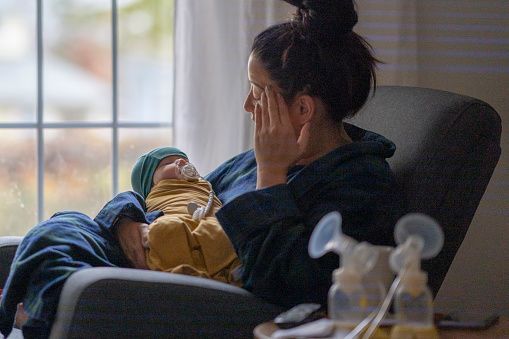
MOTHERHOOD UNTOLD: PERINATAL MENTAL HEALTH
Originally posted on the FIT4MOM blog.
Written by: Adrienne Griffen
*You are not alone. Our blog series, Motherhood Untold, tells the stories of real moms navigating the real challenges and struggles of motherhood. This month we're telling Adrienne Griffen a story about postpartum depression and anxiety.
Please note this blog contains a discussion of postpartum depression and anxiety that may be triggering for some readers. If you or someone you know is suffering from postpartum depression and/or anxiety, please know that Postpartum Support International (www.postpartum.net, 1-800-944-4773, text 503-894-9453) is here to help, you are not alone. Please continue at your own discretion.*
Having a new baby can be the happiest time in a family’s life; however, this is not always the case for every mama.
Mental health conditions are the most common complication of pregnancy and childbirth impacting 1 in 5 pregnant or postpartum patients (that’s 800,000 families each year in the United States). Mental health conditions – primarily anxiety and depression – can turn a joyful period into a time of sadness, loneliness, and guilt.
I remember when I experienced postpartum depression and anxiety after my son was born in 2001. I had a scary emergency C-section, and he would likely have died if we weren’t in the hospital. He wanted to be held all the time and would not take a bottle. I was exhausted and overwhelmed caring for a toddler and a newborn. At my lowest point, I ran away from home, telling my husband he could have the house, the children, the car, the clothes; all I wanted was to find somewhere to sleep for about a month.
When I finally connected with doctors who understood what I was going through, I quickly started feeling better with a combination of more sleep, talk therapy, and anti-depressant medication. Eventually, I became a phone volunteer responding to calls and emails from new mothers and those who love and care for them with Postpartum Support International (PSI) — the world’s leading organization in providing information and support to individuals experiencing maternal mental health conditions. After a few years and another baby, I started a support group at a local hospital, and later founded Postpartum Support Virginia (PSVa), a nonprofit organization that I led for ten years,
Here are a few things that parents should know about mental health conditions:
Perinatal mental health (PMH) conditions – often referred to under the umbrella term “postpartum depression” -- can occur any time during pregnancy or the first year after pregnancy and can include anxiety, depression, panic attacks, obsessive-compulsive disorder, post-traumatic stress disorder. PMH conditions are bio-psycho-social illnesses, meaning that the root of the illness is often multi-factorial. Up to 1 in 10 dads and partners will also experience anxiety/depression during the childbearing years. It is crucial that those experiencing these illnesses understand that they are not at fault.

Symptoms of PMH conditions include those commonly associated with depression (feeling sad, hopeless, alone) and anxiety (feeling overwhelmed, worried, fearful). Many new parents, primarily mothers, have scary intrusive thoughts of hurting themselves or their babies.
*Please note that having thoughts does NOT mean that you are going to act on them. *
In addition, individuals experiencing PMH conditions may often say things like:
· I’m exhausted, but can’t sleep, even when my baby sleeps.
· I feel like I am drowning.
· I am overwhelmed with rage (often focused on their partner).
· I feel like the worst mother in the world.
· My family would be better off without me.
· I feel guilty for having these feelings.
Some of the well-known risk factors for PMH conditions include personal or family history of anxiety or depression, sensitivity to hormone changes, lack of social support — especially from a partner, traumatic birth, and major life stressors such as the pandemic, financial stress, or death/illness of a loved one. Certain individuals are at increased risk for experiencing mental health issues during the childbearing years, including:
· those who have had a previous experience with a maternal mental health condition
· individuals who live in poverty
· individuals who identify as BIPOC or LGBTQ
· parents who have a baby in the neonatal intensive care unit
· military parents

Fortunately, PMH conditions are often temporary and treatable. The path to wellness generally includes a combination of self-care, social support, therapy or counseling, and medication.
Let’s start with self-care, which is the easiest to access and has the lowest cost. Getting 5-6 hours of uninterrupted sleep is the single most important, least expensive, most effective thing new parents can do to start feeling better. How to do this with a newborn or other children in the house? Try splitting the night into two shifts with one adult (partner, friend, grandparent, doula) sleeping while the other adult is “on duty”. Not romantic, but practical and short-term. Next up: adequate nutrition. Try stocking a feeding station with a cooler with high-protein snacks (such as cheese sticks or yogurt) and water. Light exercise – such as a walk around the neighborhood – can bring the benefits of fresh air, change in scenery, Vitamin D from the sun, and feel-good endorphins. Finally, all new parents deserve time off every day, even if it is just 15 minutes to take a shower, check social media, take a walk, or enjoy a cup of coffee.
Social support is another low-cost, high-benefit intervention. Online support groups, new parents’ groups, and fitness classes (FIT4MOM!) can provide an opportunity to meet other new parents. Friends and family can provide support such as running errands, tidying the house, folding laundry, or simply holding the baby so parents can take a nap, a shower, or a walk.
FIT4MOM played a key role in my path to recovery. I met wonderful friends who valued exercise. I had something on the calendar to get me and my children out of the house. I exercised outdoors, which I love to do, and then we played with our new friends. I eventually became a Stroller Strides instructor, which gave me a sense of purpose and meaning as I helped others transition to parenthood.
Talk therapy or counseling can be extremely helpful in working through some of the challenges that come with new parenthood, including changes in roles and responsibilities, conflict over approaches to parenting, and stress caused by lack of sleep and the demands of caring for a newborn.
Fortunately, there are safe and effective medications that pregnant and breastfeeding parents can take to treat maternal mental health conditions. Any decision about taking medication should always be made in consultation with health care and mental health providers. And there are alternative and complementary approaches, as well as new therapies, for those with persistent and stubborn symptoms.
You can’t tell by looking whether someone is experiencing mental health challenges, so here are a few suggestions for sussing out how new parents are doing:
· ASK new parents how they are doing. Really look the person in the eye and ask about HER / HIM – not about the baby.
· NORMALIZE their experience. Let new parents know that they are not alone, that lots of parents struggle with the transition to parenthood, and that help is available.
· HELP by offering to take the baby so the new parents can take a nap or take a shower or take a break. Do a chore: cook dinner, fold the laundry, do the dishes, walk the dog.
· CONNECT new parents with help. Tell new parents about Postpartum Support International, an organization with dozens of online support groups and volunteers in all 50 states who provide support and local resources. (www.postpartum.net, 1-800-944-4773, text 503-894-9453).
YOU ARE NOT ALONE. YOU ARE NOT TO BLAME. WITH HELP, YOU WILL BE WELL.
About Adrienne Griffen
Adrienne Griffen, MPP, is the founding Executive Director of the Maternal Mental Health Leadership Alliance (mmhla.org), a nonpartisan nonprofit organization dedicated to national advocacy for the mental health of childbearing women in the United States. MMHLA advocates for universal education, screening, referral, and treatment of postpartum depression and related maternal mental health challenges.
Adrienne is also the founder of Postpartum Support Virginia (postpartumva.org), which she started to fill a gap in services: when she experienced postpartum depression and anxiety in 2002, it took almost six months to find the help she needed. Under Adrienne’s leadership, PSVa grew into a statewide network of support groups and maternal mental health coalitions which have helped thousands of new mothers. For her efforts, Adrienne was selected as the Peer Specialist of the Year by the National Council for Behavioral Health (January 2016) and a Woman of Vision by Arlington County’s Commission on the Status of Women (June 2018).
Adrienne serves on the Board of Directors of the Marce Society of North America and the Mental Health Liaison Group, as well as on the American College of Obstetricians and Gynecologists Committee on Practice Bulletins – Obstetrics.
Adrienne graduated from the US Naval Academy and has a Master’s in Public Policy from Harvard’s Kennedy School of Government. Her early career included military and federal government service at the White House, Pentagon, and IRS. Adrienne lives in Arlington VA with her husband and three children young adult children.
You are not alone. Find your village at a class!
